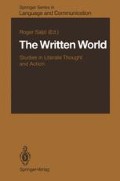Abstract
The importance of children’s literacy for formal education is almost universally accepted, and its significance for the individual in exercising and claiming political and social rights and dues is widely recognised; hence the vast extent of national and international resource and concern attached to its development. However, there are other possible consequences of the experience of learning to read, and in this paper I shall outline some of these as they bear on the nature of children’s thinking. In particular I shall consider conceptions of language, of learning and of authority.
Access this chapter
Tax calculation will be finalised at checkout
Purchases are for personal use only
Preview
Unable to display preview. Download preview PDF.
References
Ausubel, D. (1968). Educational psychology: A cognitive view. New York: Holt, Rinehart & Winston.
Barr, R. (1978). Influence of instruction on early reading. In L. J. Chapman & P. Czerniewska (Eds.), Reading: From process to practice (pp. 210–229 ). London: Routledge & Kegan Paul.
Biemiller, A. (1970). The development of the use of graphic and contextual information as children learn to read. Reading Research Quarterly, 6, 75–96.
Bradley, L., & Bryant, P. E. (1978). Difficulties in auditory organisation as a possible cause of reading backwardness. Nature, 271, 746–747.
Bradley, L., & Bryant, P. E. (1983). Categorising sounds and learning to read: A causal connexion. Nature, 301, 419–21.
Clark, M. M. (1976). Young fluent readers. London: Heinemann Educational Press.
Dahlgren, G., & Olsson, L. E. (1985). Läsning i barnperspektiv [Reading in the child’s perspective]. Göteborg: Acta Universitatis Gothoburgensis.
Downing, J. (1970). Children’s concepts of language in learning to read. Educational Research, 12, 106–112.
Ehri, L. C. (1975). Word consciousness in readers and pre-readers. Journal of Educational Psychology, 67, 204–212.
Ehri, L. C. (1976). Word learning in beginning readers and pre-readers: Effects of form class and defining contexts. Journal of Educational Psychology, 68, 832–842.
Ehri, L. C. (1979). Linguistic insight: Threshold of reading acquisition. In T. G. Waller & G. E. MacKinnon (Eds.), Reading research: Advances in theory and practice (Vol. 1, pp. 63–114 ). New York: Academic Press.
Ehri, L. C. (1984). How orthography alters spoken language competencies in children learning to read and spell. In J. Downing & R. Valtin (Eds.), Language awareness and learning to read (pp. 119–147 ). Berlin, Heidelberg, New York: Springer-Verlag.
Ferreiro, E., & Teberosky, A. (1982). Literacy before schooling. Exeter, N. H.: Heinemann Educational Press.
Francis, H. (1973). Children’s experience of reading and notions of units in language. British Journal of Educational Psychology, 43, 17–23.
Francis, H. ( 1975a, September). Reading and language learning. Paper presented at the Third International Child Language Symposium, London.
Francis, H. (1975b). Language in childhood. London: Paul Elek.
Francis, H. (1982). Learning to read. London: Allen & Unwin.
Francis, H. (1984). Children’s knowledge of orthography in learning to read. British Journal of Educational Psychology, 54, 8–23.
Gibson, E. J., & Levin, H. (1975). The psychology of reading. Cambridge, Ma.: M.I.T. Press.
Heath, S. B. (1983). Ways with words. Cambridge: Cambridge University Press. Liberman, I Y. (1973). Segmentation of the spoken word and reading acquisition. Bulletin of the Orton Society, 23, 65–77.
Lunzer, E., Dolan, T., & Wilkinson, E. (1976). The effectiveness of measures of operativity, language and short term memory in the prediction of reading and mathematical understanding. British Journal of Educational Psychology, 46, 295–305.
Marton, F., & Säljö, R. (1976). On qualitative differences in learning: I. Outcome and process. British Journal of Educational Psychology, 46, 4–11.
Mattingly, I. G. (1972). Reading, the linguistic process, and linguistic awareness. In J. F. Kavanagh & I. G. Mattingly (Eds.), Language by ear and by eye (pp. 133–147 ). Cambridge, Ma: M.I.T. Press.
Mattingly, I. G. (1984). Reading, linguistic awareness and language acquisition. In J. Downing & R. Valtin (Eds.), Language awareness and learning to read (pp. 9–25 ). Berlin, Heidelberg, New York: Springer-Verlag.
Olson, D. R. (1985). Computers as tools of the intellect. Educational Researcher, 14, 5, 5–8.
Pask, G. (1976). Styles and strategies of learning. British Journal of Educational Psychology, 46, 128–148.
Pramling, I. (1983). The child’s conception of learning. Göteborg: Acta Universitatis Gothoburgensis.
Pramling, I. (1988). Entrance into the “world of learning”. In this volume.
Reid, J. (1966). Learning to think about reading. Educational Research, 9, 56–62.
Schieffelin, B. B., & Cochran-Smith, M. (1984). Learning to read culturally: literacy before schooling. In H. Goelman, A. Oberg, & F. Smith (Eds.), Awakening to literacy (pp. 3–23 ). Exeter, N.H.; Heinemann Educational Press.
Scribner, S., & Cole M. (1981). The psychology of literacy. Cambridge, Mass.; Harvard University Press.
Söderbergh, R. (1971). Reading in early childhood. Stockholm: Almqvist & Wiksell.
Watson, A. J. (1984). Cognitive development and units of print in early reading. In J. Downing & R. Valtin (Eds.), Language awareness and learning to read (pp. 93–118 ). Berlin, Heidelberg, New York: Springer-Verlag.
Weber, R. (1970). A linguistic analysis of first-grade reading errors. Reading Research Quarterly, 5, 427–451.
Editor information
Editors and Affiliations
Rights and permissions
Copyright information
© 1988 Springer-Verlag Berlin Heidelberg
About this chapter
Cite this chapter
Francis, H. (1988). Learning to Read — Some Possible Consequences for Thinking. In: Säljö, R. (eds) The Written World. Springer Series in Language and Communication, vol 23. Springer, Berlin, Heidelberg. https://doi.org/10.1007/978-3-642-72877-8_9
Download citation
DOI: https://doi.org/10.1007/978-3-642-72877-8_9
Publisher Name: Springer, Berlin, Heidelberg
Print ISBN: 978-3-642-72879-2
Online ISBN: 978-3-642-72877-8
eBook Packages: Springer Book Archive

